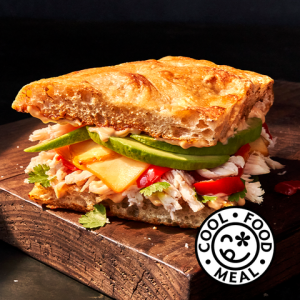On Wednesday, Panera Bread announced that it will become the first fast-casual restaurant to commit to becoming climate positive by 2050. Although the year 2050 might seem like a long way off, Panera has curated a plan in line with The Paris Agreement timeline, putting them on track to remove more carbon from the atmosphere than they emit within the next 30 years. In light of this news, Worth sat down with Panera’s CEO, Niren Chaudhary, and VP of Sustainability, Sara Burnett, to discuss their goals and how the company plans to get there. Before the 2050 goal, though, Panera has set three main goals to achieve by 2025: Transition their bakery and cafe menu to be composed of 60 percent Cool Food Meals; update all of their packaging to be 100 percent recyclable, reusable and compostable; and commit 50 percent of its national operations to using renewable energy.
Panera has always had a strong commitment to sustainability and has followed through on its commitments to reducing their emissions. In 2017, Panera committed to reducing its direct carbon emissions footprint by 15 percent by 2022 and were able to reach that goal this year. Chaudhary explained that sustainability has always been a priority at the dining chain, and now more than ever is the time to take drastic action. “We don’t inherit the world, we borrow it from our children,” Chaudhary told Worth, and this outlook has driven Panera to become a leader of sustainability in the fast-casual dining industry.

One of the ways that Panera is leading the industry in sustainability is through its Cool Food Meals, which are items on the menu that are climate-friendly and labeled as such. Burnett explained that at Panera, they do not believe that transitioning to primarily climate-friendly meals means that their customers must sacrifice flavor or quality. In fact, some of their most popular dishes, such as the chipotle chicken avocado melt and broccoli cheddar soup, are part of their Cool Food menu. By providing information about their climate-friendly meal choices on its menu, Panera harnesses the power of the conscious consumer, and the potential impact is astounding. “If every American was to replace 10 quarter-pound burgers and fries with 10 Panera chipotle chicken avocado sandwiches and chips, that alone is the equivalent of taking 16 million cars off the road in the U.S. for one year,” Chaudhary told Worth.
labeled as such. Burnett explained that at Panera, they do not believe that transitioning to primarily climate-friendly meals means that their customers must sacrifice flavor or quality. In fact, some of their most popular dishes, such as the chipotle chicken avocado melt and broccoli cheddar soup, are part of their Cool Food menu. By providing information about their climate-friendly meal choices on its menu, Panera harnesses the power of the conscious consumer, and the potential impact is astounding. “If every American was to replace 10 quarter-pound burgers and fries with 10 Panera chipotle chicken avocado sandwiches and chips, that alone is the equivalent of taking 16 million cars off the road in the U.S. for one year,” Chaudhary told Worth.
Panera has recognized that providing its customers with information can have a massive environmental impact that does not need to come at the expense of its shareholders. Chaudhary notes that the key to lasting sustainability is figuring out how to make sustainable choices that ultimately strengthen your business because protecting the financial viability of the company is the only way to ensure the longevity of a climate-positive model. Panera’s goal—to remove more carbon than it emits by 2050—is a lofty one and some of the challenges the company will face are predictable. “We want to move to using 50 percent green energy, but only 21 percent of the energy sources in the U.S. are green,” says Chaudhary, “and so for me, this is a test of leadership.”
As the first fast-casual restaurant chain to announce its commitment to climate positivity, Panera is hoping to have an impact not just within its industry, but throughout the supply chain as well. Burnett stressed to Worth that “in addition to our industry peers, this is also about engaging the broader food industry because for us to reach our climate goals, our impact goes all the way back to the farmer and then all the way forward to the landfill that the waste [goes] to. And so we are really hoping to engage our industry peers but also the entire supply chain.”

“By elevating our ambition and saying that neutral is not enough, positive is what we need, we are hoping that our industry peers will join us,” Chaudhaury emphasizes.
By cultivating an awareness of its environmental impact company-wide, Panera has been able to set and achieve its climate change goals thus far, and this announcement is the next step in Panera’s long history of sustainability initiatives that will, the company hopes, encourage others to do the same.







